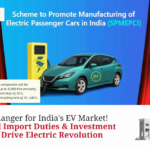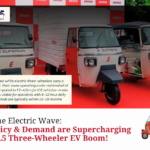
India’s EV game plan includes a new policy that may cut import tariffs and boost investment in electric mobility.
India’s electric vehicle landscape may be in for a strategic shift. As global trade discussions with major partners like the United States and European Union gain momentum, the Indian government is considering a more flexible EV import policy to align with emerging trade dynamics.
✅ What’s Driving the Policy Review?
At the center of this policy reconsideration is the prospect of reduced import duties on electric vehicles. If ongoing international negotiations lead to tariff reductions close to or even below the 15% rate already offered under India’s current EV policy, the government may revise its approach to keep India competitive in the global EV market.
✅ Current Policy Snapshot: SPMEPCI Framework
The existing framework—Scheme to Promote Manufacturing of Electric Passenger Cars in India (SPMEPCI)—grants international EV manufacturers the ability to import up to 40,000 completely built units (CBUs) over five years. However, this comes with stringent conditions:
- A minimum investment of $500 million in local manufacturing
- Progressive targets for local value addition
- The intent behind this structure is clear: attract global EV players while reinforcing India’s Make in India vision.
✅ High Tariffs Hindering EV Entry
Currently, India imposes:
- 100% import duty on EVs priced above $40,000
- 70% duty on lower-priced models
- While the 15% concessional rate under the new policy aims to soften this blow, several global automakers remain hesitant. They’re watching closely to see if ongoing trade negotiations yield broader tariff reductions, which may make India’s current conditions—high investment and localisation—less appealing by comparison.
✅ What Could Change?
According to senior government sources, the policy could undergo several key relaxations:
- Zero import duty for select vehicles
- Reduced investment thresholds
- Loosened localisation rules
- Or a combination of the above
- Such adjustments are being carefully timed with the conclusion of trade deals to ensure India remains attractive to global automakers while also protecting domestic EV interests.
✅ Policy on Hold – But Not for Long
With high stakes involved, the final guidelines of the EV policy are now expected only after trade talks conclude. The government is taking a strategic pause to balance foreign investment incentives with growth of India’s own EV ecosystem.
✅ A Defining Moment for Clean Mobility
India’s EV sector stands at a critical inflection point. Global EV leaders are keen to enter, but need clarity on tariffs and regulations. By potentially easing its policy, India has a golden opportunity to become a global EV manufacturing hub—if the balance between openness and self-reliance is struck wisely.As we await the outcomes of trade talks and the policy updates that follow, one thing is clear—the choices made in the coming months could define the next decade of electric mobility in India.










